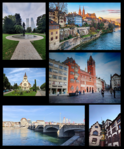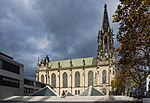Basel Historical Museum
Carriage museumsCultural property of national significance in Basel-StadtHistory museums in SwitzerlandHistory of BaselMuseums established in 1894 ... and 3 more
Museums in BaselMuseums in Basel-LandschaftMünchenstein

The Basel Historical Museum (German: Historisches Museum Basel) is one of the largest and most important museums of its kind in Switzerland and a heritage site of national significance. It opened in 1892. The museum is divided into three buildings within the city of Basel: the Barfüsserkirche, Haus zum Kirschgarten and Musikmuseum.
Excerpt from the Wikipedia article Basel Historical Museum (License: CC BY-SA 3.0, Authors, Images).Basel Historical Museum
Barfüsserplatz, Basel Altstadt Grossbasel
Geographical coordinates (GPS) Address Nearby Places Show on map
Geographical coordinates (GPS)
| Latitude | Longitude |
|---|---|
| N 47.554722222222 ° | E 7.5897222222222 ° |
Address
Flohmarkt, Herbstmesse, Weihnachtsmarkt
Barfüsserplatz
4001 Basel, Altstadt Grossbasel
Basel-City, Switzerland
Open on Google Maps










